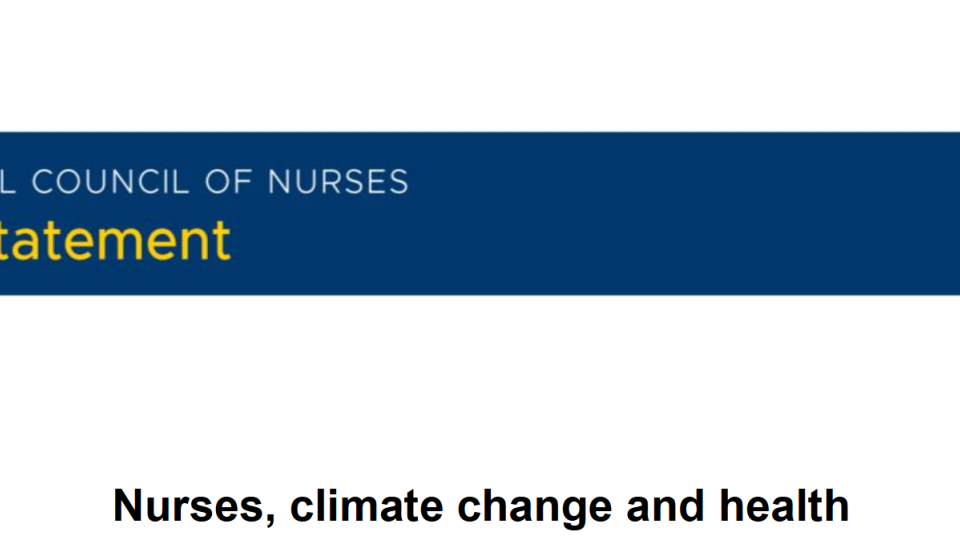International Council of Nurses calls for increased nursing leadership to combat effects of climate change on health

Geneva, Switzerland; 27 September 2018– The International Council of Nurses (ICN) has released a new position statement on Nurses, climate change and health, which calls for governments, health system leaders, national nursing associations and nurse leaders to take immediate action to mitigate climate change and to support people and communities around the world to adapt to its impacts.
Climate change presents the single largest threat to global development with the potential to undermine the past 50 years of public health gains. ICN recommends action by governments, health system leaders, national nursing associations and nurse leaders to mitigate climate change including, but not limited to, developing models of care to reduce unnecessary travel; developing climate-informed health programmes for emerging infectious and communicable diseases; engaging in sustainable practices in the health sector; building the response capacity of the health workforce; engaging in health and climate research; and participating in intersectoral policy and governance responses.
The new position statement was announced by Annette Kennedy, ICN President at the ICN Regional Conference in Abu Dhabi.
“I am proud today to be launching the ICN position statement on climate change,” said Annette Kennedy. “As the nursing profession is committed to protecting health and wellbeing and to promoting social justice, it has a duty to work to mitigate the effects of climate change and help people and systems to adapt. As the global voice of nursing, ICN’s position is that nurses have a shared responsibility to sustain and protect the natural environment from depletion, pollution, degradation and destruction.”
The effects of climate change have profound implications for human health and wellbeing. The adverse effects will arise from an impact on our most fundamental determinants of health: food, water, air and a safe environment that enables protection from extreme weather events. Health is already affected and the impacts are expected to increase as climate variability and change continue.
“There is clear relationship between climate change and health, with people in low- and middle-income countries facing disproportionate effects,” said Dr isabelle Skinner, ICN’s Chief Executive Officer.“Nurse leaders can empower individuals, families and communities to make healthy lifestyle choices; work with communities to build resilience to the impacts of climate change; and advocate for policies that promote the reduction of healthcare waste and ensure correct waste management, amongst other strategies.”
The position statement, which was developed with the input of international experts and in consultation with ICN’s members associations, sets out key recommendations for governments, nursing associations and individual nurses.
ICN:
- Urges countries, who have not yet done so, to ratify the Paris Agreement without further delay.
- Strongly believes that nurses have a shared responsibility to sustain and protect the natural environment from depletion, pollution, degradation and destruction.
- Recognises that building climate change resilience must include efforts to improve and sustain the social and environmental determinants of health through sustainable development. 3,11
- Recognises the opportunity to take advantage of the massive potential to implement mitigation and adaptation policies that also have co-benefits to health.1
- Calls on governments to scale-up financing for climate resilient health systems including developing models for healthcare workers to engage in sustainable practices. Donor countries should ensure that low- and middle-income countries are supported to strengthen their health systems and to reduce the environmental impact of healthcare.3
- Encourages governments to reduce the risks they are expected to face from climate change by making choices in how they advance technology and industry and make investments in infrastructure and public policies that have less environmental impact.
- Calls on governments to invest in climate change and public health research, monitoring, and surveillance to improve understanding of the health co-benefits of climate mitigation and the health implications of adaptation measures at the community and national levels.